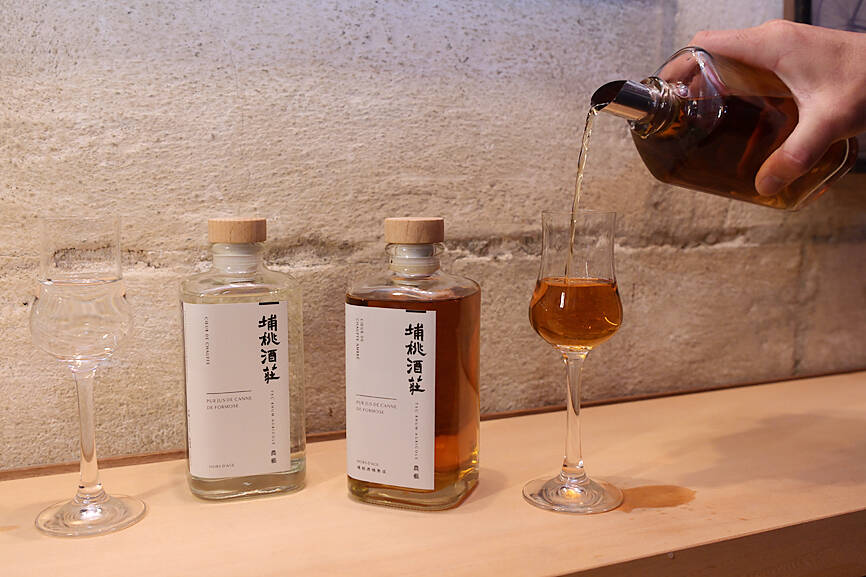Two rum products from Taiwan took the top Grand Gold prize at the Vinalies Internationales in France earlier this month. The winning rums were the result of a joint research project by Taiwan Sugar Research Institute and National Kaohsiung University of Hospitality and Tourism (NKUHT) to produce rhum agricole, a style of rum made from sugarcane juice rather than molasses.
Taiwan Sugar Corp (Taisugar) chairman Wu Ming-chang (吳明昌) said winning gold at the event has put a spotlight on Taiwanese rum.
The nation now has a prominent place in rhum agricole production and Taiwanese distilleries have a firmer foothold in local and global markets, he said.

Photo courtesy of the National Kaohsiung University of Hospitality and Tourism
The rums were made from the juice of a sugarcane variety developed in Taiwan called ROC24, which is known for its native wild cane DNA. It was cultivated at Taisugar’s Shanhua Sugar Factory in Tainan’s Liuying Plantation (柳營農場), Wu said.
The “Rhum Agricole Pur Jus de Canne de Formose Coeur de chauffe Ambre Hors d’Age” and the “Rhum Agricole Pur Jus de Canne de Formose Coeur de Chauffe Hors d’Age” were double matured in wood barrels at the Shu-Sheug Leisure Domaine in Taichung.
“The distillation and maturation process had to overcome Taiwan’s hot and humid weather. To prevent oxidation and discoloration, we fermented the sugarcane juice at a low temperature. Then we used our special techniques to distill the rum base and stored it for four years in oak barrels made by NKUHT lecturer Chen Chien-hao (陳千浩) and the Shu-Sheug Leisure Domain,” Wu said.
The result is a rum with an aroma of fresh sugarcane juice, distinct sweetness and smoothness, Wu said.
Chen said that it was not easy to reach such high quality in just four years.
The process must start with high-quality sugarcane juice, undergo distillation using special techniques, and requires a good environment and the right conditions, he said.
“Only then can we produce the honest-to-goodness original aroma, sweetness and flavor of rhum agricole,” Chen said.
Taiwan’s unique brewing culture has been lost for more than eight decades, since the then-Chinese Nationalist Party (KMT) regime implemented the system of alcohol and tobacco monopoly board after World War II, he said.
Distillery and alcohol production only became available to the private sector in recent decades, he added.

Taiwan has received more than US$70 million in royalties as of the end of last year from developing the F-16V jet as countries worldwide purchase or upgrade to this popular model, government and military officials said on Saturday. Taiwan funded the development of the F-16V jet and ended up the sole investor as other countries withdrew from the program. Now the F-16V is increasingly popular and countries must pay Taiwan a percentage in royalties when they purchase new F-16V aircraft or upgrade older F-16 models. The next five years are expected to be the peak for these royalties, with Taiwan potentially earning

POSITIVE DEVELOPMENT: Japan and the US are expected to hold in-depth discussions on Taiwan-related issues during the meeting next month, Japanese sources said The holding of a Japan-US leaders’ meeting ahead of US President Donald Trump’s visit to China is positive news for Taiwan, former Japan-Taiwan Exchange Association representative Hiroyasu Izumi said yesterday. After the Liberal Democratic Party’s landslide victory in Japan’s House of Representatives election, Japanese Prime Minister Sanae Takaichi is scheduled to visit the US next month, where she is to meet with Trump ahead of the US president’s planned visit to China from March 31 to April 2 for a meeting with Chinese President Xi Jinping (習近平). Japan and the US are expected to hold in-depth discussions on Taiwan-related issues during the

‘LIKE-MINDED PARTNER’: Tako van Popta said it would be inappropriate to delay signing the deal with Taiwan because of China, adding he would promote the issue Canadian senators have stressed Taiwan’s importance for international trade and expressed enthusiasm for ensuring the Taiwan-Canada trade cooperation framework agreement is implemented this year. Representative to Canada Harry Tseng (曾厚仁) in an interview with the Central News Agency (CNA) said he was increasingly uneasy about Ottawa’s delays in signing the agreement, especially as Ottawa has warmed toward Beijing. There are “no negotiations left. Not only [is it] initialed, we have three versions of the text ready: English, French and Mandarin,” Tseng said. “That tells you how close we are to the final signature.” Tseng said that he hoped Canadian Prime Minister Mark Carney

STAY IN YOUR LANE: As the US and Israel attack Iran, the ministry has warned China not to overstep by including Taiwanese citizens in its evacuation orders The Ministry of Foreign Affairs (MOFA) yesterday rebuked a statement by China’s embassy in Israel that it would evacuate Taiwanese holders of Chinese travel documents from Israel amid the latter’s escalating conflict with Iran. Tensions have risen across the Middle East in the wake of US and Israeli airstrikes on Iran beginning Saturday. China subsequently issued an evacuation notice for its citizens. In a news release, the Chinese embassy in Israel said holders of “Taiwan compatriot permits (台胞證)” issued to Taiwanese nationals by Chinese authorities for travel to China — could register for evacuation to Egypt. In Taipei, the ministry yesterday said Taiwan